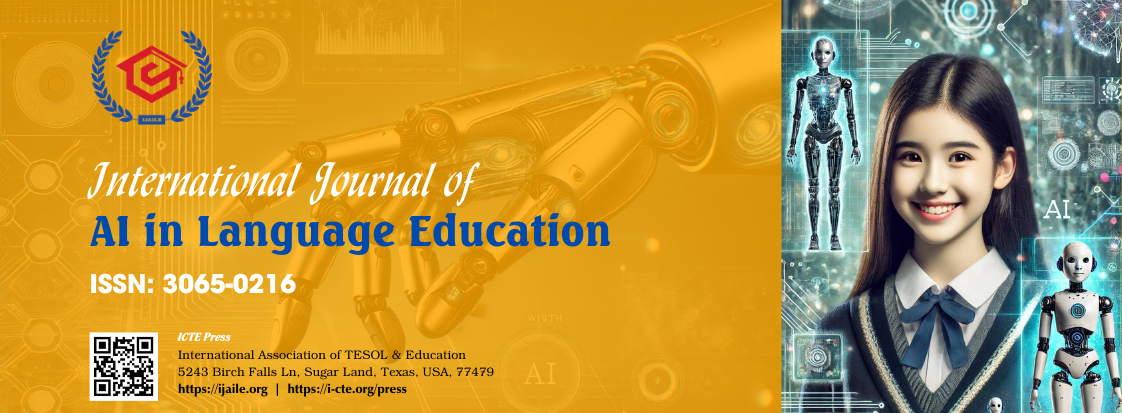Vietnamese Rural High School Students’ Perspectives on Benefits and Challenges of Implementing Artificial Intelligence in English Language Learning
DOI:
https://doi.org/10.54855/ijaile.25226Keywords:
EFL , Artificial Intelligence, high school, rural, VietnamAbstract
Artificial intelligence (AI) is changing how students learn English as a Foreign Language (EFL), offering students more authentic ways to improve their English. However, challenges remain, particularly for students in rural areas, which may hinder their language development. Despite interest in AI-based EFL education, very few research has been conducted in rural high schools, leaving a significant research gap. Therefore, to address this gap, the study explored the perspectives of 35 rural high school students on the benefits and challenges of using AI in EFL learning. A mixed-methods approach, combining an online survey and semi-structured interviews, revealed that AI presents both positive and negative effects in rural settings. Based on these results, the study recommends solutions such as hybrid models, integrating technology with traditional teaching methods.
References
Bộ Giáo dục và Đào tạo [Ministry of Education and Training (MOET)]. (2018). Chương trình giáo dục phổ thông - Chương trình môn tiếng Anh [General education curriculum – English curriculum] https://cdn-i.vtcnews.vn/files/attach/2018/12/27/22-ct_tieng-anh-3_12-2330.pdf
Cambridge University Press. (n.d.). Artificial intelligence. In Cambridge Dictionary. https://dictionary.cambridge.org/dictionary/english/artificial-intelligence
Chikatimarla, A. K., & Rao, T. N. P. (2024, July). AI in rural development: A study on the monitoring and impact evaluation of AI initiatives. Seminar Proceedings, India, 36-43.
Dinh, T. B. H. (2025). Factors affecting ICT integration of EFL teachers at a Vietnamese university. International Journal of AI in Language Education, 2(1), 55-73. https://doi.org/10.54855/ijaile.25214 DOI: https://doi.org/10.54855/ijaile.25214
Haristiani, N. (2019, November). Artificial Intelligence (AI) chatbot as language learning medium: An inquiry. Journal of Physics: Conference Series, 1387(1), 012020. IOP Publishing. https://doi.org/10.1088/1742-6596/1387/1/012020 DOI: https://doi.org/10.1088/1742-6596/1387/1/012020
Hazaymeh, W. A., Bouzenoun, A., & Remache, A. (2024). EFL instructors’ perspective on using AI applications in English as a foreign language teaching and learning. Emerging Science Journal, 8, 73-87. http://dx.doi.org/10.28991/ESJ-2024-SIED1-05 DOI: https://doi.org/10.28991/ESJ-2024-SIED1-05
Hoang, V. V. (2016). Renovation in curriculum design and textbook development: An effective solution to improving the quality of English teaching in Vietnamese schools in the context of integration and globalization. VNU Journal of Science: Education Research, 32(4), 9-20. DOI: https://doi.org/10.25073/2588-1159/vnuer.3845
Kamarullah, K., Sarinauli, B., & Syahmidi, H. (2024). AI writing tools in the classroom: Investigating usage, challenges, and adaptations by rural English teachers. Premise: Journal of English Education and Applied Linguistics, 13(3), 1018-1044. https://doi.org/10.24127/pj.v13i3.10914 DOI: https://doi.org/10.24127/pj.v13i3.10914
Kaplan, A. (2021). Higher education at the crossroads of disruption: The university of the 21st century. Emerald Publishing Limited. https://doi.org/10.1108/978-1-80071-501-120211011 DOI: https://doi.org/10.1108/978-1-80071-501-120211011
Kim, H. S., Cha, Y., & Kim, N. Y. (2021). Effects of AI chatbots on EFL students' communication skills. Korean Journal of English Language and Linguistics, 21, 712-734. https://doi.org/10.15738/kjell.21..202108.712 DOI: https://doi.org/10.22251/jlcci.2021.21.10.37
Kim, H. S., & Cha, Y. (2023). The role of AI translators on reading comprehension. Korean Journal of English Language and Linguistics, 23, 38-58. https://doi.org/10.15738/kjell.23..202301.38 DOI: https://doi.org/10.15738/kjell.23..202301.38
Moybeka, A. M., Syariatin, N., Tatipang, D. P., Mushthoza, D. A., Dewi, N. P. J. L., & Tineh, S. (2023). Artificial intelligence and English classroom: the implications of AI toward EFL students’ motivation. Edumaspul: Jurnal Pendidikan, 7(2), 2444-2454. DOI: https://doi.org/10.33487/edumaspul.v7i2.6669
Nadimpalli, M. (2017, June). Artificial intelligence risks and benefits. International Journal of Innovative Research in Science, Engineering and Technology, 6(6), n.p.
Nguyen, T. Y. P., Nguyen, N. T., & Phan, N. K. H. (2025). The challenges of applying ChatGPT in academic writing of postgraduate students in English major at IUH. International Journal of AI in Language Education, 2(1), 20-37. https://doi.org/10.54855/ijaile.25212 DOI: https://doi.org/10.54855/ijaile.25212
Pham, N. N. H. (2025). The use of ChatGPT in EFL students as a learning assistant in their writing skills: A literature review. International Journal of AI in Language Education, 2(1), 38-54. https://doi.org/10.54855/ijaile.25213 DOI: https://doi.org/10.54855/ijaile.25213
Pham, T. T., Nguyen, L. A. D., Dang, H. M., & Le, T. T. P. (2023). Exploring tertiary Vietnamese EFL students’ engagement in vocabulary learning through the use of an AI Tool. In Proceedings of the AsiaCALL International Conference, 4, 129-149. DOI: https://doi.org/10.54855/paic.23410
Pitychoutis, K. M., & Al Rawahi, A. (2024). Smart teaching: The synergy of multiple intelligences and artificial intelligence in English as a foreign language instruction. Forum for Linguistic Studies, 6(6): 249–260. https://doi.org/10.30564/fls.v6i6.7297 DOI: https://doi.org/10.30564/fls.v6i6.7297
Richards, J. C., & Rodgers, T. S. (2014). Approaches and methods in language teaching. Cambridge university press. DOI: https://doi.org/10.1017/9781009024532
Sumakul, D. T. Y., Hamied, F. A., & Sukyadi, D. (2022). Artificial intelligence in EFL classrooms friend or foe. LEARN Journal Language Education and Acquisition Research Network, 15(1), 232-256.
Vo, N. T. T., & Ho, T. N. (2024). Ảnh hưởng của công cụ trí tuệ nhân tạo đối với quá trình tự học tiếng Anh của sinh viên ngành ngôn ngữ anh, Trường Đại học Ngoại ngữ-Đại học Đà Nẵng. Tạp chí Khoa học và Công nghệ-Đại học Đà Nẵng, 22(5B), 7-10.
Vera, F. (2023). Integrating artificial intelligence (AI) in the EFL classroom: Benefits and challenges. Transformar, 4(2), 66-77.
Vesselinov, R., & Grego, J. (2012). Duolingo effectiveness study. City University of New York, USA, 28(1-25).
Yang, J. (2024). The perception of pre-service English teachers' use of AI translation tools in EFL writing. The Journal of the Convergence on Culture Technology, 10(1), 121-128.
Zhao, Q., & Nazir, S. (2022). English multimode production and usage by artificial intelligence and online reading for sustaining effectiveness. Mobile Information Systems, 2022(1), 6780502. https://doi.org/10.1155/2022/6780502 DOI: https://doi.org/10.1155/2022/6780502
Downloads
Published
Issue
Section
License
Copyright (c) 2025 Le Son Tan (Author)

This work is licensed under a Creative Commons Attribution 4.0 International License.












